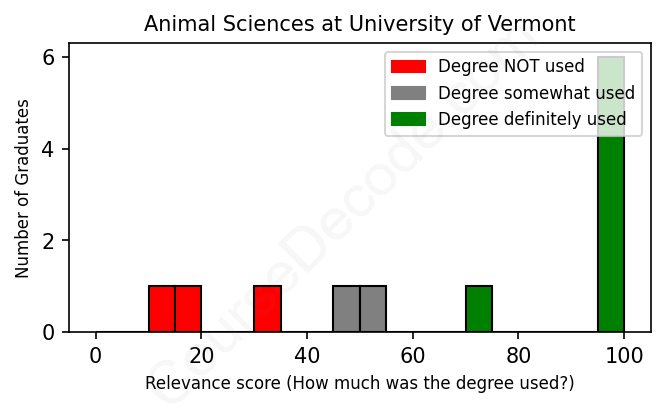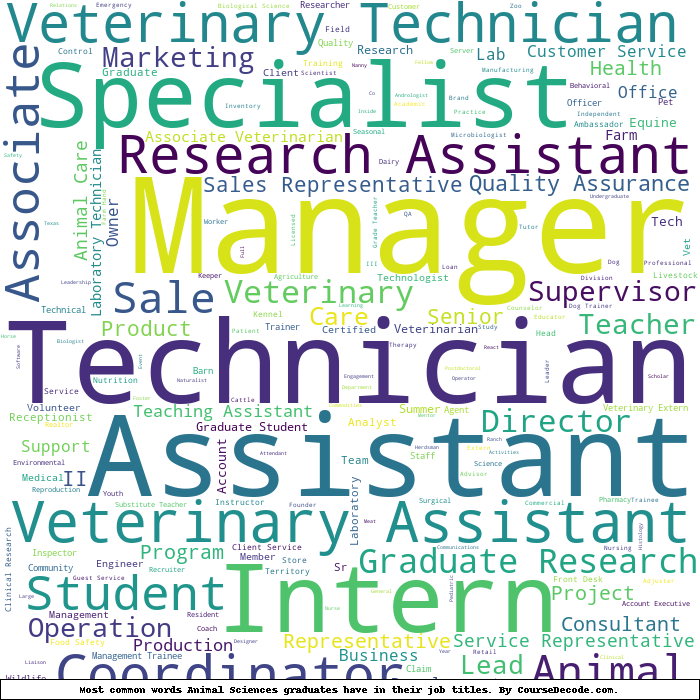
First, some facts. Of the Animal Sciences graduates from University of Vermont we've analyzed , here's how many have used (or NOT used) their degree in their career:

These are estimates based on AI analysis of 12 LinkedIn profiles (see below).
The verdict? Slightly above average. Overall, with an average relevance score of 68%, Animal Sciences graduates from University of Vermont have a slightly higher likelihood (+1%) of finding work in this field compared to the average graduate across all fields:
And for comparison, here's the chart for all profiles we've looked at across all degrees.
Also, after graduating, only 16% of these graduates have pursued further education other than another Bachelor's degree (such as a Masters degree or other), compared to the average across all profiles of 35%. This suggests a Bachelors degree is enough for most Animal Sciences graduates, and it's normal to look for work straight after graduation.
See the details:
|
Relevance score: 47% We think this person has gone into a career only somewhat relevant to their degree. We think this person has gone into a career only somewhat relevant to their degree.
DEGREE INFOGraduated in 2014 from University of Vermont with a Bachelor's degree in Animal Sciences. No other secondary education since. JOB HISTORY SINCE GRADUATIONInternal Medicine Veterinarian Technician Assistant Cornell University Veterinary Specialists Aug 2014 - Jun 2015 Sales Representative and Ski Technician  The Outdoor Gear Exchange Oct 2015 - Apr 2017 Partner  PawsON Marketing Nov 2017 - Feb 2020 Social Media, Events, Grant, and Outreach Coordinator  The Outdoor Gear Exchange Dec 2017 - Oct 2020 Community Relations and Social Media Manager  The Outdoor Gear Exchange Oct 2020 - Feb 2022 Executive Director  Stowe Trails Partnership Jan 2022 - Present ABOUTI have spent the duration of my career chasing opportunities that help me improve the lives of those around me. This has enabled me to lead teams and organizations focused on advancing opportunities for outdoor recreation and conservation, something Im inspired by and find deeply meaningful.I do my best work in team environments where everyone can share ideas and feedback, though I love when I can put my head down and cross items off the task list. Mission-driven organizations are what I seek out and I thrive on building partnerships, project management, strategic planning, and strong communication. As a self-starter, I appreciate the opportunity to think creatively to help contribute to the organizations work. |
The top 10 most common jobs done by the graduates we've analyzed (ranked most common to least) are:
When looking at the job history of University of Vermont graduates with degrees in Animal Sciences, a few clear trends pop up. A significant portion of them has landed roles as Veterinary Technicians or Veterinary Assistants, which makes total sense since these positions directly apply their education and skills in animal care and health. Additionally, many have worked as Animal Technicians in various settings, such as pharmaceutical companies. These roles are also highly relevant since they involve hands-on animal care and research—an excellent fit for their academic background.
However, not every job on the list ties back to their major that well. Some grads took roles that are more administrative or focused on fields unrelated to animal sciences, like human resources, web development, or even teaching. Though these jobs might utilize some skills learned during their studies (like communication or organizational skills), they don't directly engage with the core aspects of Animal Sciences. Overall, while a good number of graduates are working in relevant fields, there's a considerable chunk that has drifted away from the direct applications of their degree. It's a mixed bag, but at least there's a solid foundation for those aiming to stay true to their animal-loving roots!
Here is a visual representation of the most common words in job titles for Animal Sciences graduates (this is across all Animal Sciences graduates we've analyzed, not just those who went to University of Vermont):

Looking at the career trajectories of graduates from the Animal Sciences program at the University of Vermont, it seems like many of them tend to start out in entry-level roles in veterinary or animal care positions right after graduation. Jobs like Veterinary Technician, Animal Technician, and Veterinary Assistant are common first steps for these graduates, which makes sense given their educational background. Roles that involve direct animal care or support are a great way to gain practical experience, and it seems like a lot of them stick to this path initially. Many of the 2011 and 2013 graduates, for example, began their careers working in hospitals or labs, which are closely related to their studies in Animal Sciences.
However, as we look at their career paths five to ten years later, the picture starts to diversify. While some folks remain in animal care positions, others transition into very different roles, like administrative or recruiting jobs in healthcare. It’s a mixed bag. You have some graduates who move up the ladder in animal care or related fields, becoming veterinary technicians or managers, while others shift their focus entirely into fields that don’t directly relate to Animal Sciences, like marketing or education. Overall, it seems like there’s a solid foundation in animal-related roles early on, but after a few years, some graduates explore a broader range of career opportunities. It’s not always directly linked to what they studied, but it does show that their skills are transferable in various sectors! So, if you're thinking about an Animal Sciences degree, be ready for both animal care and some unexpected paths down the line!
Honestly, a Bachelor’s degree in Animal Sciences can be pretty challenging, but it really depends on the person. You'll be diving into topics like animal biology, nutrition, and even genetics, which can get pretty complex. Classes often involve a decent amount of lab work and hands-on experiences, especially if you're studying anything related to agriculture or veterinary sciences. While some students might find the work manageable, others might struggle with the science-heavy curriculum. So, if you’re passionate about animals and ready to put in the effort, it can be a rewarding journey, but don’t expect it to be a walk in the park! Overall, I’d say it’s a bit tougher than the average degree, especially for those who aren't used to science coursework.
Most commonly, in the LinkedIn profiles we've looked at, it takes people 4 years to finish a Bachelor degree in Animal Sciences.
Looking at these Animal Sciences grads from the University of Vermont, it seems like they’ve found a range of jobs that vary quite a bit in terms of pay. Many of them started off as animal technicians or veterinary assistants, which usually don’t pay all that much—often around $12 to $20 per hour. However, some have progressed into more specialized roles and administrative positions that likely come with better salaries, especially those in research coordination or management roles like the Community Relations Manager. Overall, it seems like they could be making decent money later in their careers, especially if they keep climbing the ladder in their respective fields, but the early gigs probably weren’t bringing in a ton. So, if you’re looking at a future in animal sciences, just know that it might take some time and experience to really start seeing the paycheck you want!
Here is a visual representation of the most common words seen in the "about" section of LinkedIn profiles who have a Bachelor degree in Animal Sciences (this is across all Animal Sciences graduates we've analyzed, not just those who went to University of Vermont). This may or may not be useful:

Here are all colleges offering a Bachelor degree in Animal Sciences (ordered by the average relevance score of their Animal Sciences graduates, best to worst) where we have analyzed at least 10 of their graduates:
| College | Score | Count |
|---|---|---|
 Purdue University Purdue University
|
80 | 14 |
 California State Polytechnic University-Pomona California State Polytechnic University-Pomona
|
78 | 13 |
 North Carolina State University North Carolina State University
|
77 | 18 |
 Iowa State University Iowa State University
|
75 | 25 |
 University of Missouri-Columbia University of Missouri-Columbia
|
75 | 12 |
 South Dakota State University South Dakota State University
|
73 | 10 |
 The Ohio State University The Ohio State University
|
71 | 21 |
 University of Florida University of Florida
|
68 | 15 |
 University of Vermont University of Vermont
|
68 | 12 |
 Michigan State University Michigan State University
|
67 | 20 |
 University of California, Davis University of California, Davis
|
66 | 27 |
 University of Illinois at Urbana-Champaign University of Illinois at Urbana-Champaign
|
63 | 16 |
 University of Tennessee, Knoxville University of Tennessee, Knoxville
|
61 | 13 |
 University of Arkansas University of Arkansas
|
60 | 10 |
 California Polytechnic State University-San Luis Obispo California Polytechnic State University-San Luis Obispo
|
59 | 22 |
 University of Wisconsin-River Falls University of Wisconsin-River Falls
|
58 | 10 |
 Texas A&M University Texas A&M University
|
54 | 34 |
 Penn State University Penn State University
|
53 | 14 |
 Texas Tech University Texas Tech University
|
51 | 12 |
 Kansas State University Kansas State University
|
51 | 22 |
 Oklahoma State University Oklahoma State University
|
43 | 16 |